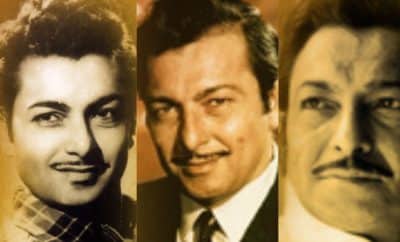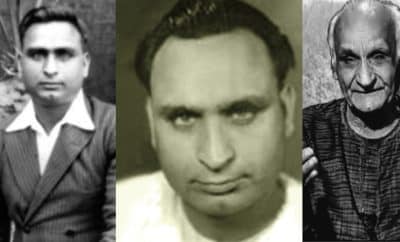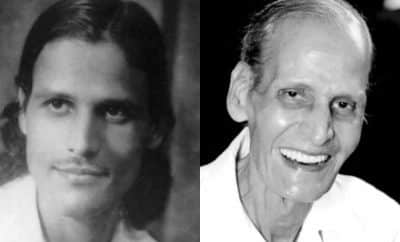Song Sketch
Tiller’s Tale – Story Behind Making Of The Song Kasme Vaade Pyar Wafaa – Upkar
Before we begin with story, here’s something about the authors Anirudha Bhattacharjee and Balaji Vittal.
Anirudha and Balaji have co-written two books. R D Burman – The Man The Music, which won them the National award in 2012 and Gaata Rahe Mera Dil, the MAMI award in 2015. Their 3rd book is expected to be launched in June 2018.
Balaji Vittal grew up in Calcutta and graduated from Jadavpur University. He has worked with leading organizations like Wipro, Standard Chartered Bank and Royal Bank of Scotland and is an avid Bollywood follower. He freelances for Metroplus, The Hindu and online magazines like Quint and Scroll. Balaji now works for Concentrix in Bengaluru and keeps shuttling between Bengaluru and Hyderabad where his family lives.
Anirudha Bhattacharjee, an alumnus of IIT Kharagpur, is a SAP practitioner who sings when he is not traveling on work. Apart from singing, he loves to spend time with his family and watch biopics, films by Hitchcock, Ray and Wilder, and essentially comedies – Chaplin, Keaton, Bud Spencer and Terence Hill, Crazy Boys series, in fact the whole lot including middle-class-comedies by Basu Chatterjee and Hrishikesh Mukherjee.
This particular article is the first draft of a song story which they wrote for their book Gaata Rahe Mera Dil.
Here’s the uncut version of the story behind making of Kasme Vaade Pyaar Wafaa Sab from Upkar (1967).
Tiller’s Tale
Kasme vaade pyaar wafa sab, baaten hain baaton kaa kya
Koi kisi ka nahin ye jhoothe, naate hain naaton ka kya
Hoga maseehaa saamane tere
Phir bhi na tu bach paayega
Tera apna khoon hi aakhir
Tujhko aag lagaayega
Aasmaan mein udne wale
Mittii mein mil jaayega
Sukh mein tere saath chalenge
Dukh mein sab mukh modenge
Duniyaa wale tere bankar
Tera hi dil todenge
Dete hain bhagwaan ko dhokha
Insaan ko kyaa chhodenge
Kaam agar yeh Hindu ka hai
Mandir kisne luta hai
Muslim ka hai kaam agar yeh
Khuda ka ghar kyon toota hai
Jis mazhab mein jaayez hai yeh
Woh mazhab toh jhootha hai
Upkar (1967)
Music director – Kalyanji Anandji
Lyrics – Indeevar
Singer – Manna Dey
One is no prude in the socio-economic history of India but we know that our economy has always been agrarian based. But then, the ‘Jai Jawan Jai Kisan’ rallying cry of Lal Bahadur Shastri notwithstanding, was the 1960s about ruralising the country? That’s what Manoj Kumar would have his audience believe. Upkar prejudices everything urban, painting city dwellers as debauched, orgy- hungry, immoral exploiting vampires in Ambassador cars. The economic agenda of the country’s premiership was not to keep rural India isolated. It was about enabling it with technology, power and education to help it capitalise its core strengths better. It was not about a man in trousers and slack shirt ploughing a field bucketing tears of remorse at having strayed from his roots. Manoj Kumar either read it wrong or his hostility to the ‘city’ in Upkar was purely his personal viewpoint. Being a stickler for details too has never been the strength of Hindi film makers, and we find World War II Messerschmitt fighter planes in action on the Indo Pak border.
Another point of view regarding the script of Upkar was also floating around, but never scrutinized for correctness. A play named Awaz, written by Anand Chaturvedi had been broadcast by Lucknow Radio Station in 1964. The subject of the film practically echoed the theme of the play, as pointed out by dial chasers during that time.
Where Upkar plays truant with history too is in the portrayal of the farmer. Is personal wealth creation in a lawful manner not the objective of any enterprise including farming? If one can link the timing of Upkar with that of the Green Revolution in Punjab, what Manoj Kumar is telling his audience that ‘You dare not be financially well off’. Austerity is by choice – and it need not come at the cost of being able to uplift living conditions.
Maybe by default the ‘sutradhar’ of Upkar Malang Chacha (played by veteran actor Pran) was the bridge between the pale white uni -dimensional viewpoint and a more cosmopolitan disposition that should have been. Kasme vaade pyaar wafa sab penned by Indiwar is the worldly wise balancing act. The lyrics had come forth as an outcome of a real life incident. Discloses Anandji bhai, “There was this young banker employed with Barclays Bank in Tanzania who had fallen in love with a girl in India. He had given her a 25 paise coin as a token of his promise that he would come back soon to marry her. I was on a tour to Africa and the young man asked me convey to her the seriousness of his intent to marry her. When we reached back, we found that we had received the girl’s wedding invitation card”.
The story continues as Anandji bhai rolls back in time, “Indiwar and I were going in a car wondering how to break the news to our friend in Tanzania, how much it would hurt him when he came to know about it. I had also fractured my leg and maybe as a result of that, was in a slightly philosophical frame of mind. I suddenly mused, Ye kasme wade ye pyar wafa, sab baatein hain, in baton ka kuch bharosa nahi hai… Indiwar said that the lines were wonderful and that it could make a mukhra. When we got back to my home, the entire mukhra was created including the 2nd line which Indiwar added. The philosophical chat continued after dinner, discussing life and music….. Our thoughts floated… What is life all about? How selfish can man be? One mother takes care of 9 children but the 9 of them find it difficult to take care of one aged mother. The height of irony is that – after one’s death his own son has the audacity to set him on fire. Thence came the line, ‘… tera apna khoon hi aakhir tujhko aag lagayega…’. It was 3 am or 4 am. ‘Yaar ye to khatarnak gaana ho gaya hai’, Indiwar said adding that suddenly he was feeling scared to go home, lest his own son should set him on fire. Mere beta hi mere ko jala dega saala! Finally around 7 am or 8 am Indiwar left for home”, remembers the composer.
“Manojji wanted this song before interval. When we viewed this film for the first time in Delhi, we were apprehensive that people might leave the cinema hall at this song, given that it was a slow song. But the scene was so captivating that nobody moved from his seat” Anandji recalls.
Draped in heavy, flowing robes for a crippled man, Malang Chacha is the reviewer and commentator through most part of the film from a narrative standpoint, apart from being Bharat’s mentor in the core story.
In Upkar, the rubber meets road at the juncture where the ambitious and impressionable younger brother Puran (Prem Chopra) is used as a bait to split the Bharat household. Bharat was the screen name finalized by Manoj Kumar, which came at the expense of the initial screen name ‘Ram’ he had sought for himself in the film. Despite Bharat’s entreats, Puran wrenches out the partition. Bharat’s last ditch effort to dissuade Puran meets with mulish refusal. Brothers part ways. Opportunistic tradesmen exchange victorious glances. The expansive fields suddenly look barren sans human relationships. Bharat lets him have the entire cake rather than have to go thru the pain of seeing his land and home divided. In return he exhorts Puran not to sell the land; and gets silence as a response from his brother.
The answer comes from elsewhere. ‘Why do you pin your faith on the assurances purported in the promises made and the love bequeathed thou?’, asks the one-legged ballad, witness to this emotional exchange.
“We used just the click-click followed by the single ‘boom’ on the percussion as the beat. This was consistent with the desolate emptiness of the song sequence”, recounts Anandji Shah, the surviving partner of the Kalyanji-Anandji duo. The rhythm arrangement was by Babla Shah. “We had used a timpani and a duff for creating the sound. The click-click sound was generated by wooden blocks”, recounts Babla. Timpani (or kettledrum) had evolved from the military drums to become part of the conventional orchestra. It consists of a large copper base over which the skin is stretched. They are played by striking the skin with a timpani mallet. The hollow strike of the timpani in Kasme wade pyar wafa runs like a motif throughout the song, signifying the vacant heartbeat of desolation.
Kalyanji Anandji, true to their style, settled for a simple tune with fandangles a attached in the arrangement for the song. It was meant for a villager to sing. Complexity would have robbed the song of its basic naiveté. The mukhra is on low notes. Notes which add to a melody of resignation. The antara, one the other hand, goes high, testing the singers’ prowess. It is more geared to register the feeling of yearning, as if asking God for an explanation. The use of lyrics like Aasmaan mein udne wale or Dete hain bhagwaan ko dhokhaa augment the mood expressed by the tune. In a radio interview by Kalyanji which was re-broadcast in June 2012 in a tribute programme, Kalyanji mentioned that the tune was composed by Anandji. In an exclusive interview with the authors, percussionist Babla Shah, the younger sibling of Kalyanji and Anandji ratifies the same.
The song progresses at a leisurely pace. Manna Dey sings the first two lines with additional inflexions, something which is not there in the main body of the song. The song is structured in a way that each lyric communicates fresh grief, each verse pulls the new fanged ambition-on-the-sleeve order further and further away from the traditional virtues of patience, faith in basics and remaining focussed on core strengths. Finally they cross the point of no return in the foreseeable future.
This song may not have tested Manna Dey’s classical groundings as much as it evinced his sensitivity and pathos. This track was originally offered to Kishore Kumar who, on hearing the tune, suggested that Manna Dey would be best suited to deliver the kind of emotion it mandated. Manna Dey considers this song was one of his best in his career. According to him, there was a buzz in Bombay during that time that such soulful singing had not happened in Bombay in the last five years. Further, Lata Managehskar, after listening to this song, personally called him up and paid tribute to the exceptional feelings that the veteran singer endowed the song with. Manna, with soulful renditions for composers like Shankar Jaikishan, Salil Chowdhury and S D Burman had already created a benchmark for sentimental numbers to follow. With Kame vaade, the idea was further reinstated. Soulful singing was not merely about emotion. It was about deep introspection too.
Surprisingly, in spite of such otherworldly renditions of light songs, there were composers who considered Manna Dey’s voice as dry and low on sentimental expression. There have been instances where songs for which Manna Dey would have been an automatic choice were given to other singers. This also includes songs demanding knowledge of Indian classical music.
But that was probably Manna Dey’s karma. In spite of belting out champagne stuff, he had to be satisfied with dry bread. Call it fate. Call it the breeding of mediocrity by the Bombay film industry.
Indeevar’s poetry, though not revolutionary, was exceptionally apt for the situation, at least for the mukhra and the first two antaras. The third antara sounds more of an ‘Manoj Kumarian’ influence with his Bharat avatar playing overtime and suggesting some stupid religious sentiments.
Along with the fact this poetry was undoubtedly among Indiwar’s best, one regrets the fact he did not quite live up to his promise of Safar (1970), Anokhi Raat (1968) and Upkar later in the late 1970s and 1980s. His association with Disco and the southern trash of 1980s may have been driven by expediency to stay in the market. This essay wishes to direct the readers to the class that Indiwar truly was made of but one which was underutilised. Upkar could have been Rajesh Khanna’s first film in a negative role. Manoj Kumar had offered the role of Puran to him, which he refused.
Upkar was a face changer for actor Pran. He shed his two-decade old screen villainy (though he had sporadically acted in non-villainous roles before, like in Raj Kapoor’s Aah (1953)), opening up opportunities for pivotal character roles in the next 14 years; something that he did astonishingly well, showing how a good artiste can shed typefaces and just ‘be’ the role that the script demands.
And Manna Dey became the voice of Pran as the two (once again in a Kalyanji Anandji score) jived one evening in an Afghani Mehfil in Zanjeer.
What happened to the broken hearted banker of Indian origin from Tanzania? Not sure what happened to his love life but 10 years later he made a film that stands out as a cult even in the new millenium. The young man was Chandra Barot, Director of Don (1978).




Dinesh Shah
May 3, 2018 at 4:25 pm
Thank you Deepa for sharing this lovely experience of the Iconic song Kasme Vaade..from Upkar.
Deepa
May 11, 2018 at 7:16 pm
Pleasure,thank you 🙂
Dilip Apte
July 29, 2018 at 6:37 pm
A must share Deepa.I am going backin date to your blogs , I have missed or not received
Thanks
RAJENDRA NARDEKAR
June 6, 2020 at 7:03 pm
Thank you Deepa for the wonderful narration of the making of Kasme Wade Pyar Wafa… The song is a legend, must have heard million times. Was also thrilled on hearing the making of the song, when Anandjibhai was guest judge in the Marathi program ‘Sur Nava Dhyas Nava’.